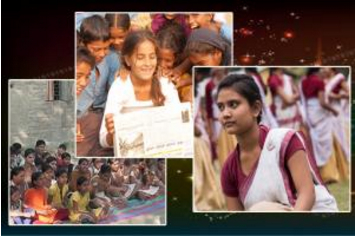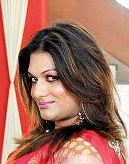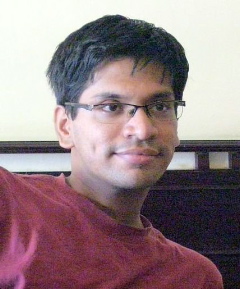From Academia to America
By Aniruddhan Vasudevan
Despite the existence of desi queer collectives and communities here in DC, the responses and reactions of many Americans (both white and black people) to the visible presence of a queer person coming from India (me, in this case) have been a wee bit strange for me. As long as they assume I am a queer from here (the US), the conversation and their interest in talking to me goes one way. The moment they come to know that I am an out-queer living in India, everything changes. Sometimes it feels like a healthy interest, on their part, in knowing how it is to be queer and out in some other cultural, political, religious space. Some other times, they quickly conflate the images and news of punishment and execution of homosexual people in west Asian countries together with their general, relative ignorance about the East in total, and suddenly I am a whole other person for them.
One person even suggested that a continued US presence in that area will help to kill off fundamentalism and make this easy for you all! First, I really saw in my mind’s eye all Asian countries losing borders, melting and becoming a huge blob that he could conveniently call that area! Secondly, it was a very confusing argument for me: that a queer-hating government’s deplorable attempts at ravaging Iraq, Iran and Afghanistan only in the interests of access to oil resources, can even be validated as something that will prove to be easy on homosexual people in the long run. That opinion was twisted at so many places that it sent me on a dizzy spell! The issue of homosexuality, freedom, war, plundering, imperialism, coercive thrusting of one brand of democracy etc. were all so generously conflated into one single statement that it left me speechless for a while as to which one I take issues with first.
Another interesting experience I have had is when I become the quintessentially exotic Other: dancer, Indian, queer. I exist in this very objectified space for some people especially after performances. Dancing, in itself, is an exercise in vulnerability. To put one’s (gendered, sexed, coloured) body out there in that space and move in ways that call attention to it are, for me, moments when I willingly make myself vulnerable, not to physical abuse, but vulnerable to gaze, identity-framing, and objectification. Then some of them want to know some specifics. If I am Hindu or Muslim? Since I am Hindu, some of them try to know where I stand vis-a-vis the Kamasutra and Khajuraho temples.
The only stand I really have vis-a-vis these two is that I have partly read a cheap (unillustrated!) edition of the Kamasutra and I have visited the Khajuraho temples!
However, without trying to be so obsessively anti-Orientalist, I try to make use of these knowledges (if you can call them that), to talk a bit about the positions that different cultural traditions take towards sexuality. By being hyper-sensitive about how I am perceived, I do not want to lose making at least part of my position clear to such people . My engagement with cultural theories should not only enable me to talk to academics and other people who do theory, but empower me to deal with undeniably concrete realities when I am faced with them. I cannot walk out from such situations saying that people don’t understand that my identity is a free-floating signifier and they are doing huge disservice to the world of discourses! But it does baffle me when I cannot, somehow, afford to be half as ignorant as they are: ‘You don’t know who Mormans are?’ ‘You don’t know what Quesedilla is? what Halloween is?’ ! The expectation of knowing is very unequal.
One day, I ended up going to a meeting of the lgbt chapter of a widely-known human rights organization in DC, with an American friend. There were five people there, including me! My sense of pride in my support group in Chennai and its meetings grew manifold! In that meeting, for this one guy who appeared to me the group chairman or something, I did not exist! We sat around a table in Starbucks. I was like one foot away from him. But I simply did not exist. I am glad he did not place his heavy bag on me thinking that the chair was unoccupied! My friend sensed it, got annoyed and said ‘Aniruddh, why don’t you tell us about the campaign against the anti-sodomy law in India?’ I still did not exist for him, hence I also did not have a voice! The other two were interested and asked questions.
A few days hence, while walking back to my apartment after a late rehearsal, I was waiting at the traffic lights to cross. A very loud black man singled me out for harassment! He walked behind me two blocks yelling, ‘Hey! Are you Paki? You muslim asian? Are you terrorist? You gonna blow up ma place? etc! I felt like I was walking under a particularly unwanted spotlight in that mixed neighbourhood. At the human rights organization meet, there was an attempt at invisibilizing and here in this incident on the road, I was super-visible as something I am not. In this man’s ignorance, I ended up being all that threatens America.
I am not simply complaining. What I am saying is that, I begin to feel that even when one travels for the first time somewhere, that romantic sense of happy anonymity that I used to believe in, is not really there. Perhaps it existed in those times when communities really lived in complete ignorance about one another and occasional travellers (like Hieun Tsang or Fa Hien or Marco Polo) operated as windows to cultural exchange. Now, in spite of the so-called information explosion online, on TV, etc., what we have is not so much as awareness as it is some funny, a priori knowledge about you that precedes you where you go. You don’t really get to go somewhere just as you, hoping that no one knows you, you don’t know anyone. People sort of already know you in a million different ways, most of which constitute a type, and they either verify you against that prototype or simply take you to be that. Even when you concede ignorance about them, the concession becomes one-way sometimes.
It is in these moments that I have been able to arrive at significant cultural understandings. Not about some specific culture, but in terms of ‘difference’,’Other’,’perception of the Other’,’ignorance’,’unevenness of that ignorance’ etc. It is in the face of these realities that my theory and politics have had to play out. I have found my engagement with theory [I mean cultural theory(-ies)] very empowering. I now find this engagement much more interesting and productive than a battle of theories that I often engage in.
An after-thought: I want to say that I am not positing, or subscribing to, a false binary of Theory and Reality or Practice. However, I have come to make a distinction between theorizing simply as a stimulating intellectual exercise and theorizing as a liberatory practice. By liberatory,I mean something that inserts that zone of self-reflexivity between experience and response. It gives a zone to move in where what comes under scrutiny is not just the experience but also one’s sense of one’s self.
This post was written originally in Oct 2007 for Pass the Roti on the Left Hand Side.




